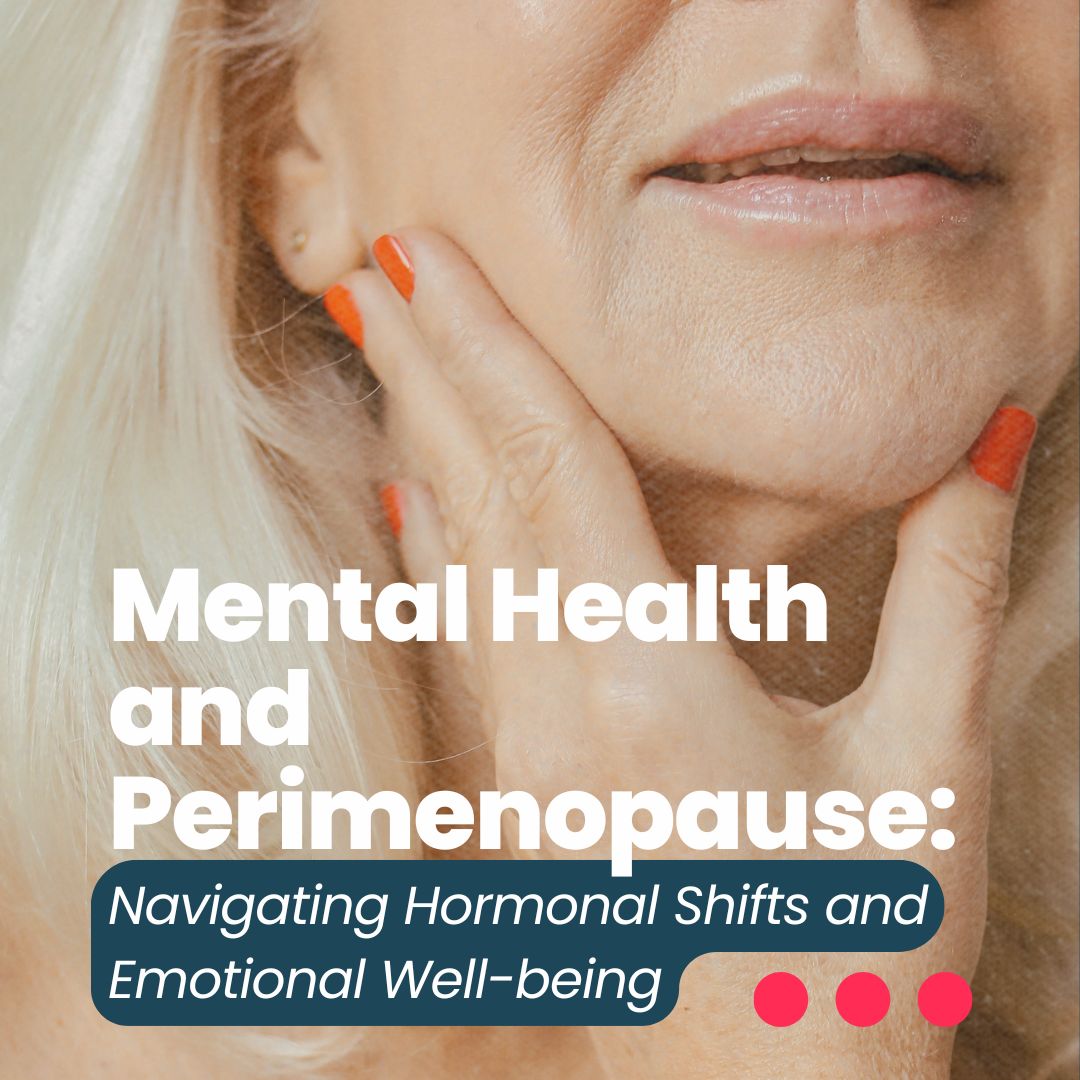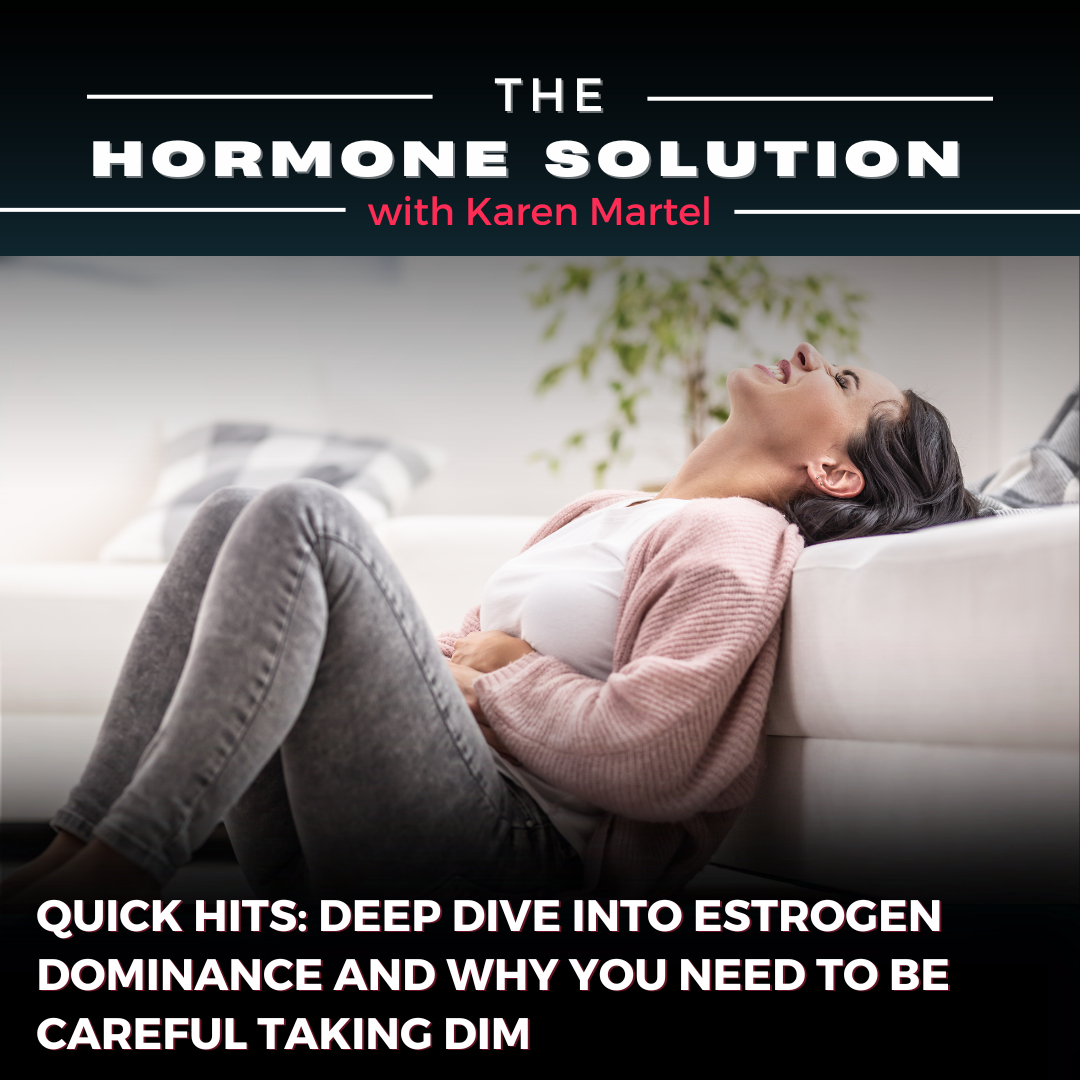
Mental Health and Perimenopause: Navigating Hormonal Shifts and Emotional Well-being
When we think of perimenopause, most of us imagine the physical changes—hotflashes, night sweats, weight gain, and sleep disturbances. But, there's another majoraspect of this transition that often gets overlooked: mental health. There's growingawareness of the connection between perimenopause and mental health, and let’s bereal—this is a conversation we need to have. For many women, the emotional rollercoaster of perimenopause can feel like anunexpected twist in the midlife chapter. The mood swings, anxiety, and even episodesof depression often come out of nowhere, leaving us wondering if it's all just in ourheads (spoiler alert: it’s not). In fact, studies have shown that hormonal fluctuationsduring perimenopause—particularly in estrogen, progesterone and testosterone—play a huge role in mental health. Women who have a history of depression are at an evenhigher risk of experiencing depressive episodes during this time.
The Hormonal Connection
So, what’s really happening with your hormones during perimenopause? Well, it's a bit of a symphony, but not the relaxing kind. As we approach menopause, our levels of estrogen and progesterone start to fluctuate—sometimes dropping suddenly, other times rising unpredictably.
Estradiol plays a key role in regulating mood and emotional well-being during perimenopause. One of its primary influences is on serotonin, a neurotransmitter responsible for feelings of happiness and emotional stability. Estradiol helps boost serotonin levels and increases the sensitivity of serotonin receptors, which can enhance mood and reduce feelings of depression or anxiety. Additionally, estradiol positively affects oxytocin, the "bonding hormone" promoting feelings of connection and emotional warmth. It also influences dopamine, which is tied to motivation and pleasure. As estradiol levels fluctuate in perimenopause, these neurotransmitter systems become imbalanced, contributing to mood swings, irritability, and heightened emotional
sensitivity.
Progesterone plays a critical role in mental health, largely due to its impact on GABA (gamma-aminobutyric acid), the brain's primary calming neurotransmitter. GABA helps to inhibit excessive brain activity, promoting relaxation, reducing anxiety, and encouraging restful sleep. Progesterone enhances the effects of GABA by binding to GABA receptors, increasing its calming influence on the nervous system. This action makes progesterone a natural mood stabilizer, helping to reduce anxiety, stress, and irritability. During perimenopause, fluctuating progesterone levels can reduce GABA's effectiveness, leading to mood swings, heightened anxiety, and difficulty sleeping. The calming effects of progesterone on GABA highlight its importance for mental health and emotional regulation throughout hormonal changes.
Testosterone is not just a "male hormone"; it's vital for women as well. It contributes to feelings of well-being, energy, and motivation. Low testosterone levels in women have been associated with symptoms such as fatigue, depression, irritability, and a reduced sense of well-being. Some research suggests that testosterone has antidepressant effects, helping stabilize mood and reduce anxiety.
One of testosterone’s most well-known roles in women is its effect on libido. Low levels can lead to reduced sexual desire, which may also impact emotional and relational well-being. Improved testosterone levels can lead to an increased sense of vitality, enhancing overall mood and reducing irritability.
Research backs this up. According to the Journal of Affective Disorders, hormonal fluctuations during perimenopause increase the risk of mood disorders. And for women who have experienced depression in the past, this risk is even higher. One study published in JAMA Psychiatry found that women with a history of major depression were twice as likely to experience depressive episodes during perimenopause compared to women without a history of depression.
The highest rate of suicide among women tends to occur in middle-aged groups, particularly between the ages of 45-64. In recent years, there has been a notable rise in suicides within this age range, especially among White, non-Hispanic women. This increase is often linked to various factors such as declining mental and physical health, the hormonal fluctuations of perimenopause, and societal pressures.
Interestingly, midlife women, particularly those in perimenopause, experience an increased risk of suicidal ideation, even without underlying mood disorders. Hormonal changes during this stage, specifically fluctuations in estrogen, have been identified as potential contributors to mental health struggles.
If you or someone you know is struggling with thoughts of suicide, seeking support from
mental health professionals is crucial.
Addressing Mental Health During Perimenopause
Knowing this connection between hormones and mental health is empowering because it gives us the tools to take charge. If you're struggling with your emotional well-being during perimenopause, you’re not alone—and you don’t have to just ride it out. Here are few strategies to help support your mental health during this time:
1. Hormone Therapy
Bioidentical hormone replacement therapy (HRT) can be a game-changer for many women. By balancing out estrogen, testosterone and progesterone levels, HRT can help alleviate mood swings, anxiety, and depression. It’s worth having a conversation with a healthcare provider who specializes in hormone health to see if this option might be right for you.
2. Lifestyle Changes
I can’t say this enough—what you do day-to-day really matters. Exercise, good nutrition, and sleep are vital in keeping those mood swings in check. Focus on foods rich in omega-3 fatty acids (think salmon, flaxseeds, and walnuts) as they’ve been shown to improve mood and brain function. Don’t forget about magnesium, too—it's been linked to better sleep and reduced anxiety.
3. Mental Health Support
It’s important to seek out professional help if you’re feeling overwhelmed. Therapy, whether cognitive-behavioral therapy (CBT) or mindfulness-based stress reduction, can be incredibly helpful. A good therapist will guide you through coping strategies that address both the mental and hormonal challenges of perimenopause.
4. Supplements and Natural Remedies
Sometimes, adding a few key supplements can support your mental well-being. Consider magnesium (for stress), B vitamins (for energy and mood support), and adaptogens like ashwagandha, which can help balance stress hormones. Methylene blue, traditionally used as a dye and for treating certain medical conditions, has shown potential in the treatment of depression, particularly in mood disorders like bipolar disorder. It's thought to work by affecting the mitochondria and improving cellular energy production in the brain. Additionally, methylene blue acts on neurotransmitters such as serotonin and dopamine, which are crucial for regulating mood.
Some studies suggest that low doses of methylene blue may help reduce symptoms of depression, particularly when used as an adjunct therapy. However, more research is needed to fully understand its efficacy and safety for long-term mental health treatment.
I use Troscritptions Tru Blue here .
Always consult with a healthcare provider before considering methylene blue for mental health purposes. Just be sure to consult your healthcare provider before adding anything new to your routine.
Breaking the Stigma Around Perimenopause and Mental Health
The key takeaway here? Perimenopause and mental health are closely intertwined. It’s not just about hormones wreaking havoc on your body—it’s about how those hormones are affecting your brain chemistry and emotional well-being. Sadly, there’s still stigma around talking about mental health, especially during menopause. But we can break that.
By recognizing the mental health challenges that often accompany perimenopause, we can seek the right support and treatment. Don’t be afraid to speak up and get help—it’s time to prioritize your mental and emotional health just as much as your physical health.
Final Thoughts: You’re Not Alone
Navigating perimenopause can be tough, but you don’t have to do it solo. There’s help out there—from hormone therapy to lifestyle changes and mental health support—that can make this transition a whole lot easier. If you’ve been feeling off, anxious, or depressed, take it as a sign to check in with your body (and your mind) and get the help you deserve. And remember: you are not alone in this journey.
References:
- https://www.frontiersin.org/journals/psychiatry/articles/10.3389/fpsyt.2024.1408878/full
- https://www.frontiersin.org/journals/pharmacology/articles/10.3389/fphar.2024.1403969/full
- https://www.frontiersin.org/journals/public-health/articles/10.3389/fpubh.2018.00141/full
- https://www.frontiersin.org/journals/psychiatry/articles/10.3389/fpsyt.2024.1408878/full
- https://www.cambridge.org/core/journals/psychological-medicine/article/abs/mood-sensitivity-to-
estradiol-predicts-depressive-symptoms-in-the-menopause-
transition/D96C604B9C047D9A4D0B946C9747927E
- Joffe, H., et al. (2019). Depression during the menopause transition: Importance of ovarian
hormones and life context. Journal of Affective Disorders.
- Freeman, E. W., et al. (2006). Association of depression with the transition to menopause.
JAMA Psychiatry.
- https://womensmentalhealth.org/posts/suicidality-midlife/
- https://www.ncbi.nlm.nih.gov/pmc/articles/PMC3946856/

Find Karen Martel on Apply Podcast
Karen Martel is a Certified Hormone Specialist and Transformational Nutrition Coach dedicated to empowering women through their health journeys.
As the host of the popular podcast The Hormone Solution, Karen tackles the complexities of hormonal health, weight loss resistance, and the challenges that come with perimenopause and menopause.
Her mission is to disrupt outdated narratives surrounding women's health, providing reliable information and practical solutions that help women reclaim their vitality. With personal experience overcoming her own health struggles, Karen offers insights into hormone optimization and sustainable weight management strategies.
Join her as she engages in enlightening conversations with experts and shares actionable advice, all aimed at helping women navigate their unique hormonal landscapes with confidence and clarity. Tune in to discover how to embrace life's stages while enhancing overall well-being.






